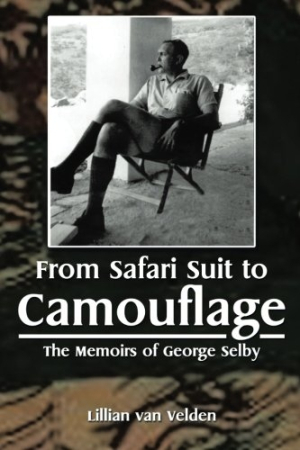From Safari Suit to Camouflage
The Memoirs of George Selby
This memoir reveals a deep love for Africa, a dream of a united country, and touching remembrances of those he once called friends.
Violent political struggle in southern Africa during the 1960s and ‘70s is the backdrop of George Selby’s new memoirs, From Safari Suit to Camouflage. The memoirs are simultaneously an elegy to the lost country of Rhodesia and a white-minority perspective on the bloody conflict that led to the nation of Zimbabwe.
Before the war, in the heyday of the 1950s, a white boy falls in love with his African homeland of Rhodesia, a British colony just north of South Africa. The first half of the book relays one swashbuckling adventure after another. Selby writes of the veld and bush, of camping and fishing and hunting, recalling run-ins with leopards, cobras, and crocodiles.
Selby’s descriptions of the way the sun sets on the African trees are beautiful, his prose painting an endearing idyll of the continent. Yet even in these youthful reminiscences, racial tensions are never out of sight. Though Selby has black friends and white friends, some still discourage interracial marriage. Homosexuality, too, is considered an abomination. Selby doesn’t criticize these prejudices as much as acknowledge their existence.
The country’s ensuing conflict turns everything on its head. The war is between Rhodesians, who are seeking transitional independence from Britain, and black nationalist guerrilla fighters led by Robert Mugabe and other insurgents. The insurgents see the war as a fight against white imperialism, while Selby sees it as an attempt to preserve nationhood and biracial political unity. As a reservist in the Rhodesian security forces, Selby is called up for combat duty throughout the war, leaving behind his wife and children. The writing takes a grim turn in these later chapters.
With the same descriptive gusto used to evoke the wilds of Africa, Selby renders the gruesome atrocities committed by the rebels, who target not only white farmers but also black chiefs and villagers who resist the nationalist movement. Antiterrorist and counterinsurgent military techniques become critical for the Rhodesian forces, though insurgents eventually win, leading to the emigration of whites and Mugabe’s dictatorial rise as Zimbabwe’s leader.
The book was compiled and edited by Lillian van Velden. Though Selby passed away before publication, his voice comes through on every page. It’s a masculine voice, tough and stubborn, alternating between swagger and some shell-shocked softness born of war.
Selby was a white man fighting beside black men against a common enemy that didn’t discriminate in its use of terror and violence. If From Safari Suit to Camouflage teaches us anything, it’s that history is more complex than black and white, that ideology warps people to do terrible things, to rape and murder and torture fellow human beings, whatever the color of their skin.
Selby was not a perfect man, but his memoirs reveal a deep love for Africa, a dream of a united country, and touching remembrances of those he once called friends.
Reviewed by
Scott Neuffer
Disclosure: This article is not an endorsement, but a review. The publisher of this book provided free copies of the book and paid a small fee to have their book reviewed by a professional reviewer. Foreword Reviews and Clarion Reviews make no guarantee that the publisher will receive a positive review. Foreword Magazine, Inc. is disclosing this in accordance with the Federal Trade Commission’s 16 CFR, Part 255.

